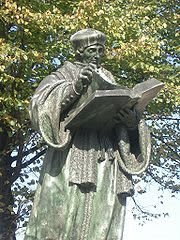
"The highest form of happiness is a life with a degree of madness."
The Dutchman Erasmus (Desiderius) from Rotterdam on 27 October 1465 or 1469 born in Rotterdam and died on 12 July 1536 in Basel. He had a brother named Peter. According to Wikipedia, he was "a scholar of European humanism." Among other things, he wrote numerous books and worked as a theologian, philologist (Language and Literature) and philosopher.
------------------------------------------------ -----------------------------
Biography:
Erasmus of Rotterdam study, after he was ordained a priest at the Sorbonne in Paris, but also in England and Italy. At the beginning of the 16th Century and a PhD in rutin doctorate in theology, his satire magazine "Encomio Moria (Praise of Folly) was known and was his collection of proverbs. Shortly after some of his works were published, he taught Greek in England and received the parish of Aldington. Later he worked at the court of Burgundy in Leuven and Erasmus' first printed edition of the New Testament (Lutheran translation) was published in Greek. This work influenced the Reformation considerably. He has published more classical texts. Erasmus of Rotterdam in 1524 moved to Geneva in order to print his works . Let He spent the next five years in Basel. He then moved to Freiburg. He was, according to the website whoiswho.de "a clerical position and was the scholastic theology skeptical, so he is a pioneer of the Reformation." Erasmus was a polymath. Later it came to the separation between the theologian Martin Luther and Erasmus of Rotterdam and his book "De libero arbitrio" broke the connection between Humanism and Reformation movements final. Desiderius Erasmus of Rotterdam died in Basel in a typhoid disease.
------------------------------------------------ ------------------------------
His works and their impact at the present time:
Erasmus of Rotterdam wrote about 150 books, including "De Puritate ecclesiae Christianae" or "de ecclesia sarcienda concordia" reasonable and modern philology as editor, grammarian and textual critic. His books shape the society today and are sometimes read in the schools. His most successful work, "Adagia" is a collection of ancient wisdom and proverbs. The "Apophthegmata" is a similar work. The usual debate in Western countries, particularly the emphasis is of Ancient Greek due to him. However, the correct pronunciation is still controversial.
His most famous work is the satirical "praise of Folly, but also the critical edition of the Greek New Testament, which shaped the Reformation, is an important part of his work. But the fact that he laid the foundation for the Reformed theology should be mentioned here. Erasmus introduced the thesis on, God has left man free will to choose between good and evil, which of course could be effective only with God's grace. This differed from Luther's thought patterns.
---------- -------------------------------------------------- ----------------------
Erasmus monument in Rotterdam

------------------------------------------- ---------------------------------------
Sources:
- Wikipedia
- www.whoiswho.de
0 comments:
Post a Comment